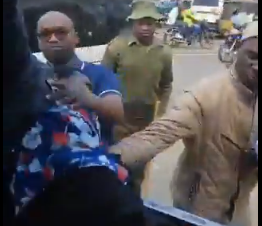
In a video which has been circulating online, plain-clothed officers are seen forcefully carrying and putting the man in a vehicle.
“My attention has been brought to a video circulating online of a person with disability being forcefully arrested during peaceful demonstrations in Nakuru... I strongly condemn this act,” Wanyonyi said in a statement on Tuesday.
“As a person living with disability, I am deeply disturbed by the manner in which the individual was mishandled.”
Wanyonyi noted that peaceful protest is a constitutional right, and no Kenyan, especially one living with disability, should be subjected to such excessive force.
The MP further criticised the conduct of the police involved, stating that the police are entrusted to protect citizens, not humiliate or harm them.
“We must uphold the dignity and rights of all people, especially the most vulnerable in our society,” he added.
In the video, one of the officers can be heard saying ''chukua hiyo simu (take that phone)", possibly referring to the phone used to film the incident.
Article 54 of the Constitution states that a Person with Disabilities is entitled to be treated with dignity and respect,.
The are also entitled to access to education and institutions that are integrated into society and reasonable access to all places, public transport and information.
PWDs are also guaranteed participation in political, economic and social life, and access to materials and devices to overcome constraints arising from the person's disability.
The National Council for Persons with Disabilities (NCPWD) is tasked with overseeing the implementation of disability rights.
At the same time, the Kenya National Human Rights Commission (KNHCR) and the Commission on Administrative Justice also help enforce rights and investigate abuse.
The use of excessive force or humiliating someone with a disability during arrest may violate human dignity (Article 28 of the Constitution), which states that “Every person has inherent dignity and the right to have that dignity respected and protected.
It may also violate freedom from torture and cruel, inhuman or degrading treatment (Article 29).
Such actions may also breach police conduct regulations under the National Police Service Act, which requires officers to act with professionalism, impartiality, and respect for human rights.










